Related Research Articles

Four main lines of evidence support attribution of recent climate change to human activities: Firstly, a physical understanding of the climate system: greenhouse gas concentrations have increased and their warming properties are well-established. Secondly, there are historical estimates of past climate changes suggest that the recent changes in global surface temperature are unusual. Thirdly, computer-based climate models are unable to replicate the observed warming unless human greenhouse gas emissions are included. And finally, natural forces alone cannot explain the observed warming.

Global dimming was the name given to a decline in the amount of sunlight reaching the Earth's surface, a measure also known as global direct solar irradiance. It was observed soon after the first systematic measurements of solar irradiance began in the 1950s, and continued until 1980s, with an observed reduction of 4–5% per decade, even though solar activity did not vary more than the usual at the time. Instead, global dimming had been attributed to an increase in atmospheric particulate matter, predominantly sulfate aerosols, as the result of rapidly growing air pollution due to post-war industrialization. After 1980s, global dimming started to reverse, alongside reductions in particulate emissions, in what has been described as global brightening, although this reversal is only considered "partial" for now. This reversal has also been globally uneven, as some of the brightening over the developed countries in the 1980s and 1990s had been counteracted by the increased dimming from the industrialization of the developing countries and the expansion of the global shipping industry, although they have also been making rapid progress in cleaning up air pollution in the recent years.
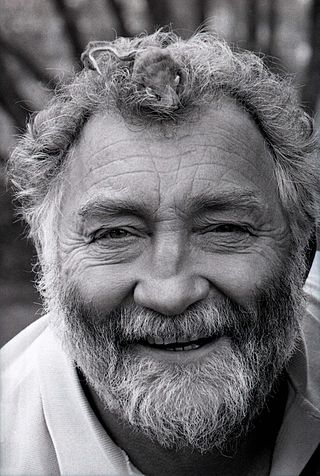
David James Bellamy was an English botanist, television presenter, author and environmental campaigner.

The National Institute of Water and Atmospheric Research or NIWA, is a Crown Research Institute of New Zealand. Established in 1992, NIWA conducts research across a broad range of disciplines in the environmental sciences. It also maintains nationally and, in some cases, internationally important environmental monitoring networks, databases, and collections.

Robert Merlin Carter was an English palaeontologist, stratigrapher and marine geologist. He was professor and head of the School of Earth Sciences at James Cook University in Australia from 1981 to 1998, and was prominent in promoting climate change denial.

The Great Global Warming Swindle is a 2007 British polemical documentary film directed by Martin Durkin. The film denies the scientific consensus about the reality and causes of climate change, justifying this by suggesting that climatology is influenced by funding and political factors. The program was formally criticised by Ofcom, the UK broadcasting regulatory agency, which ruled the film failed to uphold due impartiality and upheld complaints of misrepresentation made by David King, who appeared in the film.
August H. "Augie" Auer Jr was an atmospheric scientist and meteorologist in New Zealand.
Vincent Richard Gray was a New Zealand chemist, and a founder of the New Zealand Climate Science Coalition.

DeSmog, founded in January 2006, is a journalistic and activist website that focuses on topics related to climate change. The site was founded, originally in blog format, by James Hoggan, president of a public relations firm based in Vancouver, British Columbia, Canada.

The Deniers is a 2008 book by Lawrence Solomon, a Canadian environmentalist and writer. Subtitled "The world-renowned scientists who stood up against global warming hysteria, political persecution, and fraud," the book draws attention to a number of scientists and others who, according to Solomon, have advanced arguments against what he calls the "alarmist" view of global warming, as presented by Al Gore, the Intergovernmental Panel on Climate Change (IPCC), the mainstream media, and others. The book is based on a series of columns Solomon wrote for Canada's National Post. It has been criticized for misquoting the scientists it featured.
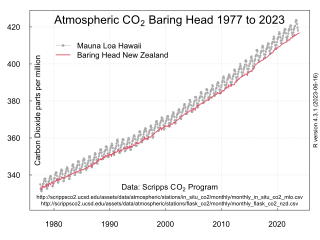
Climate change in New Zealand involves historical, current and future changes in the climate of New Zealand; and New Zealand's contribution and response to global climate change. Summers are becoming longer and hotter, and some glaciers have melted completely and others have shrunk. In 2021, the Ministry for the Environment estimated that New Zealand's gross emissions were 0.17% of the world's total gross greenhouse gas emissions. However, on a per capita basis, New Zealand is a significant emitter, the sixth highest within the Annex I countries, whereas on absolute gross emissions New Zealand is ranked as the 24th highest emitter.
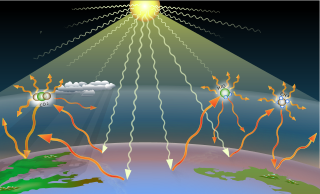
Greenhouse gases are the gases in the atmosphere that raise the surface temperature of planets such as the Earth. What distinguishes them from other gases is that they absorb the wavelengths of radiation that a planet emits, resulting in the greenhouse effect. The Earth is warmed by sunlight, causing its surface to radiate heat, which is then mostly absorbed by water vapor (H2O), carbon dioxide (CO2), methane (CH4), nitrous oxide (N2O), and ozone (O3). Without greenhouse gases, the average temperature of Earth's surface would be about −18 °C (0 °F), rather than the present average of 15 °C (59 °F).
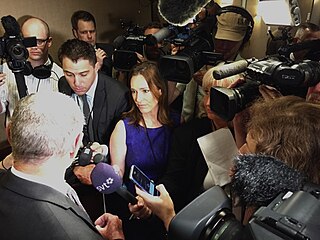
The International Conference on Climate Change (ICCC) is a conference series organized and sponsored by The Heartland Institute which aims to bring together those who "dispute that the science is settled on the causes, consequences, and policy implications of climate change." The first conference took place in 2008.
Michael James Salinger is a New Zealand climate change researcher and teacher who has worked for a range of universities in his home country and around the world. He was a senior climate scientist for a Crown Research Institute, the National Institute of Water and Atmospheric Research (NIWA), and President of the Commission for Agricultural Meteorology of the World Meteorological Organization (WMO). He has received several awards and other honours for his work with climate change and is involved in researching and monitoring past and current climate trends. Within his area of specialist scientific knowledge, Salinger has co-authored and edited a range of reports, articles and books. He was involved in an employment dispute and elements of his theory and practice were at the centre of a case against NIWA.

David Stuart Wratt is a New Zealand climate scientist who specialises in meteorology and the science and impact of climate change. He is an adjunct research fellow at the New Zealand Climate Change Research Institute at Victoria University of Wellington, and has had many roles at the National Institute of Water and Atmospheric Research (NIWA), including six years as chief scientist (climate). His current position at NIWA is emeritus scientist (climate). Wratt is a Companion of the Royal Society of New Zealand and was the chair of the society's New Zealand Climate Committee. He has had advisory roles for the New Zealand Government, including science advisor at the Ministry for the Environment, and is currently a member of the Science Board for the Ministry of Business, Innovation and Employment. He has had input into assessments by the Intergovernmental Panel on Climate Change (IPCC), notably, contributing to its award of the 2007 Nobel Peace Prize through his contributions to the IPCC Fourth Assessment Report. Wratt has worked in the United States and Australia as well as New Zealand.

Climatic Research Unit documents including thousands of e-mails and other computer files were stolen from a server at the Climatic Research Unit of the University of East Anglia in a hacking incident in November 2009. The documents were redistributed first through several blogs of global warming deniers, who alleged that the documents indicated misconduct by leading climate scientists. A series of investigations rejected these allegations, while concluding that CRU scientists should have been more open with distributing data and methods on request. Precisely six committees investigated the allegations and published reports, finding no evidence of fraud or scientific misconduct. The scientific consensus that global warming is occurring as a result of human activity remained unchanged by the end of the investigations.

Climate change feedbacks are effects of global warming that amplify or diminish the effect of forces that initially cause the warming. Positive feedbacks enhance global warming while negative feedbacks weaken it. Feedbacks are important in the understanding of climate change because they play an important part in determining the sensitivity of the climate to warming forces. Climate forcings and feedbacks together determine how much and how fast the climate changes. Large positive feedbacks can lead to tipping points—abrupt or irreversible changes in the climate system—depending upon the rate and magnitude of the climate change.
Timothy Francis Ball was a British-born Canadian public speaker and writer who was a professor in the Department of Geography at the University of Winnipeg from 1971 until his retirement in 1996. Subsequently Ball became active in promoting rejection of the scientific consensus on global warming, giving public talks and writing opinion pieces and letters to the editor for Canadian newspapers.
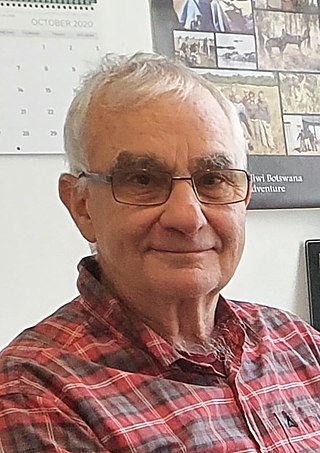
David Charles Lowe (born 1946) is a New Zealand atmospheric scientist who was instrumental in setting up the Baring Head atmospheric CO2 programme in 1972. A researcher and educator, Lowe was one of the lead authors of a 2007 Intergovernmental Panel on Climate Change (IPCC) report which was recognised with a Nobel Peace Prize.
References
- ↑ Mc Shane, Owen (1 May 2006). "Scientists Group to Refute Global Warming Claims". Press Release: Centre for Resource Management Studies. Retrieved 12 June 2010.
A group of leading New Zealand climate scientists has announced today the formation of the New Zealand Climate Science Coalition, aimed at refuting what it believes are unfounded claims about anthropogenic (man-made)global warming.
- ↑ New Zealand Climate Science Coalition (NZCSC), DESMOG Clearing The Pr Pollution That Clouds Climate Science
- ↑ "Bellamy Joins NZ Climate Science Coalition". Scoop Independent News. 17 October 2006.
- ↑ "Call for Royal Commission on Climate Change" (Press release). New Zealand Climate Science Coalition. 26 July 2006. Retrieved 17 August 2010.
- ↑ Parker, David (26 July 2006). "Royal Commission on Climate Change rejected". New Zealand Government Press Release.
- ↑ "IPCC Report slammed as "dangerous nonsense"" (Press release). New Zealand Climate Science Coalition. 10 April 2007. Retrieved 17 August 2010.
'The claims of the IPCC are dangerous unscientific nonsense', says Dr Gray.
- ↑ NZPA (15 August 2010). "Niwa sued over data accuracy". Stuff. Fairfax New Zealand Ltd. Retrieved 15 August 2010.
- ↑ "Niwa challenged over accuracy of data". New Zealand Herald. APN Holdings NZ Ltd. 15 August 2010. Retrieved 21 August 2010.
- ↑ Underhill, Jonathan (7 September 2012). "Climate change deniers swamped in NIWA court challenge". NBR.
- ↑ "New Zealand: Court Rejects Challenge to Climate Change Research Findings". Library of Congress. 7 September 2012.
- ↑ Steve Kilgallon (12 January 2014). "Failed doubters trust leaves taxpayers at loss". The Dominion Post.
- ↑ Juliet Roper et al: Doubt, Delay, and Discourse: Skeptics’ Strategies to Politicize Climate Change. Science Communication 38, 6, 2016, 776– 799, doi : 10.1177/1075547016677043.
- ↑ Puppets on a string: US think tank funds NZ sceptics
- ↑ New Zealand Climate Science Coalition caught lying about temperature trends, 26 November 2009
- ↑ Disinformation spreads confusion about the reality of climate change, Environmental Defence Fund, 21 October 2013
- ↑ "Vincent Richard Gray death notice". New Zealand Herald. 16 June 2018. Retrieved 16 June 2018.
- ↑ "Owen McShane, champion of free enterprise, dies". 7 March 2012.
- ↑ Owen McShane Credentials, Desmog, Clearing the PR Pollution that clouds Climate Science
- ↑ David Bellamy Credentials Desmog, Clearing the PR Pollution that clouds Climate Science
- ↑ "TV naturalist David Bellamy dies aged 86". The Guardian. 11 December 2019. Retrieved 12 December 2019.
- ↑ August Auer (Deceased), Desmog, Clearing the PR Pollution that clouds Climate Science Credentials
- ↑ "Controversial weatherman Augie Auer dies". stuff.co.nz. 11 June 2007. Archived from the original on 12 June 2007. Retrieved 11 June 2007.